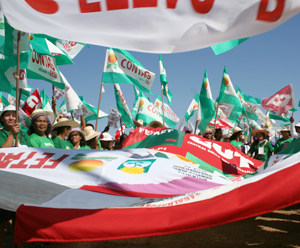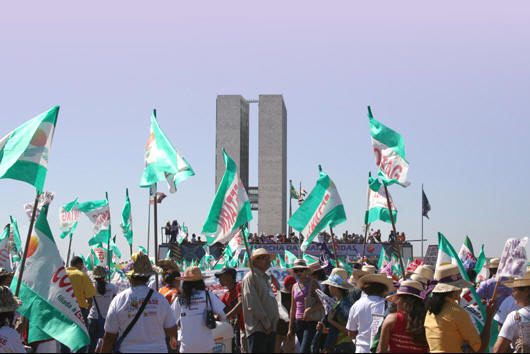|
Brasil
 |
The unyielding, joyful and firm strength of organized women
Nearly 50 thousand women gathered in Brasilia to achieve what many
describe as the world’s largest female mobilization in recent years.
In favor of women’s access to land ownership, against hunger and
sexist violence in rural Brazil, in favor of agrarian reform, and in
defense of women’s labor and social rights, the Margaridas of the
National Confederation of Agricultural Workers of Brazil (CONTAG)
shook the very foundations of capital, evidencing with each step
they took a friendly, open, all-inclusive, joyful and vigorous
strength.
There are several reasons behind the resounding success of the
Third Marcha das Margaridas*: one unquestionable reason is the
painstaking and thorough efforts of CONTAG’s Women’s
Commission to prepare the event, under the coordination of the also
vice president of the United Workers’ Federation (CUT),
Carmen Foro, and a team of almost 30 regional coordinators who
mobilized the organization’s rank-and-file throughout the country.
The women that marched in the morning of Wednesday, August 22,
forming a three-kilometer-long procession that moved down the wide
avenues of Brasilia and flowed into the monumental Congress square,
came without a doubt from “deepest” Brazil, from rural
Brazil, an essential part of the cultural wealth of a country
with the responsibility of having the world’s largest biodiversity
and fresh water reserves.
The
success is also due to the forging of a smooth, solidarity-based and
intelligent relationship with other social organizations of women,
both national and international, such as the World March of Women,
and dozens of institutions of Brazil’s feminist and urban labor
movements. This attitude of unity, openness and inclusion is
certainly another of the essential reasons that, besides adding in
quantity by swelling the numbers, contributed a unique quality to
this March, a special visibility from many social and
political arenas of Brazil.
From
yesterday to today
And
we cannot lose sight of the historical perspective, the constant
efforts made by CONTAG over the last 40 years, to arrive at
its current status of 27 Federations and 4 thousand Trade Unions
representing 20 million rural workers. That was how Manoel José
dos Santos, president of CONTAG, recounted the
organization’s history in his speech at the Marcha das Margaridas
before the National Congress. Manoel remembered the hard days
of the dictatorship, which “sought to wipe out leaders, unions,
federations, and even CONTAG itself, whose internal
organization was constantly watched by official controllers.”
He
told of heroic events and actions that kept CONTAG alive as
the dictatorship tried to take over the Brazilian social movement
and deviate it towards a comfortable and inoffensive standstill. He
recalled several fellow workers, men and women who in the “years of
lead” upheld the values of the organization, mentioning in
particular “Zefía, who was an advisor to CONTAG over
the period of the military dictatorship, and who was the first voice
that rose to defend the idea that women needed to organize at the
municipal, state and national levels. During those years, our labor
movement was sexist, refusing even to accept that women had a right
to be heard. Who can forget how back then women were only allowed to
appear at the foot of their husbands’ worker’s card? So, today, we
have to be fair and tell it like it was; our fellow worker Zefía
deserves to be remembered as the first warrior in this process of
discussion.”
Manoel
stressed that “Today, women have moved forward, organizing from
their communities and municipalities. We cannot forget to mention
our fellow worker Hilda, of Pernambuco, who was the first
coordinator of CONTAG’s Women’s Commission. She was followed
by Raimondinha Celestine, of Ceará, who was the first woman
to be elected Women’s coordinator, in a Congress of our
organization. These victories, these advances, were no gift from the
government or from male labor leaders. They are victories obtained
by all you women workers, through your courageous struggle.”
The
president of CONTAG also pointed out that “This story has a
beginning, a continuation, a present, and a future, which we’re
building; but we will never hide the contributions of the men and
women who began the struggle. How many of them are not here today
because their lives were taken away by violence? The absence of
justice in this country brought many people down. But, fellow
workers, we are building the history of this Brazil, organizing
ourselves in unions, in federations, and in CONTAG, making
our demands, pressuring all the governments, from the municipal to
the federal. At a certain point we realized that that was not
enough, that we had to change the national government, and replace
it with one committed to the working class. Until, together with
many other men and women, we were able to put our fellow worker
Lula in the Presidency. And nobody can forget the huge
contribution that came from rural Brazil, from our country’s
laborers, from our people. But this is still not enough –Manoel
continued–, we can’t go back home and lie back, contented,
because in spite of having broken the taboo of the irremovability of
Brazil’s ruling classes, we still don’t have the power, because the
House of Representatives and the Senate are still not on the side of
workers.”
The future must belong to the people
He
went on to reflect on the agricultural model that has always
prevailed in Brazil, throughout every previous government; a
model based on large landed estates and an extensive production
system that has no need for people and that drove out thousands of
families from the countryside and into the cities. “And today –Dos
Santos warned–, President Lula has the great mission of
furthering the agrarian reform and consolidating family-based
agriculture as a way of ensuring the country’s development. We’ve
made great progress, but credits are not enough; we need technical
assistance to use these resources. The size of properties must be
limited, because we cannot go on in this situation, where anyone
with enough money can just buy up the entire country. We must put a
stop to the foreigners who are coming into the country to buy land
for ethanol production, with the argument that it’s a source
of energy which is clean from an environmental point of view, losing
sight of the fact that nothing can be clean if it’s based on social
injustice. We cannot allow sugar cane to take over the lands of
family-based agriculture. We won’t be fooled by the promise of more
jobs! That’s a lie! Single-crop agriculture expands on the basis of
mechanization, and the development it produces only benefits a few
political groups, distributing no income to the people.”
 |
“So, fellow workers: you must unite! –Manoel dos Santos
exclaimed–. You, who have come all the way to Brasilia, must unite
with other millions! Let’s call on the men, so that they too will
join the struggle. Call your boyfriends, your husbands, your
brothers, and let’s fight, because only by struggling will we be
able to change this country! Before I leave I want to reach out and
touch the hearts of the men and women of this March and call
on them to move forward, now that we are so near the end of the
road.”
This moving speech was the finishing touch of an extraordinary
celebration, which was filled from the very first minute with the
joy, the lightness, the calm and friendly enthusiasm that springs
from every CONTAG mobilization, be it the Grito da Terra
or, in this case, the Marcha das Margaridas. To participate
in these mobilizations, to walk side by side these rural men and
women workers is to be involved in a discipline without threats or
vertical hierarchies, without officers or foremen. The Marcha das
Margaridas was also a march of smiles, of trust, of a clear
understanding that the time is now, but that there’s also tomorrow,
and thus all of us, men and women, deserve to be cared for. That is
why, more than just walking, this March with female imprint
soared forward with lightness and pride, with firm step and steady
course, and ended embracing the future, knowing that the Fourth
Marcha das Margaridas will find them better organized, greater
in number, stronger and with new demands and claims, but always with
the joy of being where they want to be.
Long live the Marcha das Margaridas!

|
Carlos Amorín, from
Brasilia
© Rel-UITA
August 27, 2007 |
 |
|
|
* The March is named in honor and vindication of Margarida Alves,
president of the Union of Rural Workers of Alagoa Grande,
state of Paraíba, who was murdered on August 12, 1983, as she
returned home with her ten-year old son, who witnessed his mother’s
dramatic death. Of the five large landowners identified as the
“intellectual perpetrators” of her murder, only two were brought to
trial, and they were both absolved.
|
|
Fotografías:
CONTAG
| Rel-UITA

Volver
a Portada
|
UITA - Secretaría Regional
Latinoamericana - Montevideo - Uruguay
Wilson
Ferreira Aldunate 1229 / 201 - Tel. (598 2) 900 7473 - 902 1048 -
Fax 903 0905
|